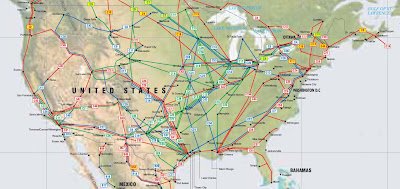Obama is Losing Pipeline Battle
“[I]f the transportation bill emerges from Congress with a provision mandating the construction of the Keystone pipeline, will the president really risk vetoing a bill that promises to create a total of three million jobs in order to satisfy the demands of the environmentalists? It’s not like they are going to vote for Romney anyway.”

By Mark J. Perry

The map above (click to enlarge) shows the existing, extensive network of energy pipelines in the U.S. with the following code: green for oil, red for gas, and blue for products such as gasoline, propane and ethylene. As I pointed out last November:
It’s important to understand that: a) the United States already has a huge, safe network of existing pipelines for oil, natural gas and gasoline illustrated in the map above, b) pipelines have been used successfully and safely in the U.S. for more than 100 years, and c) pipelines are an integral part of our domestic energy system. In other words, we live safely with energy pipelines every day and the Keystone XL pipeline would simply become one new segment of an existing and extensive pipeline network that makes a significant contribution to America’s dependable and affordable energy.
“The Keystone pipeline became a defining issue for political environmentalists who dramatized their opposition during protests outside the White House by getting themselves arrested. The activists claimed that pipeline leaks could threaten the Ogallala aquifer in the Sand Hills region of Nebraska and would exacerbate man-made global warming by enabling consumers to burn fuel produced from Canada’s oilsands.
Meanwhile the labor union wing of the Democratic Party was eagerly lobbying the Obama administration on behalf of the jobs that constructing and operating the pipeline would create. In November, Obama bravely announced that he was putting off any decision on allowing the construction of the pipeline until after the 2012 presidential election. That’s real leadership! Clearly in his electoral calculations, the Green faction won out over the union vote.
In a March trip to oil country, Obama reiterated his support for building the southern leg of the Keystone pipeline, assuring audiences that it is a “priority” for his administration. Perhaps recent poll numbers showing that 57 percent of Americans approve of the pipeline and that only 29 percent oppose it is prompting the president to do a bit of recalculating with regard to his electoral math. Meanwhile the clock is ticking because TransCanada’s February southern leg application triggered a 45-day deadline by which the Army Corps of Engineers must deny construction permits, or they are automatically approved by default. We will soon find out just how expeditiously helpful the Obama administration means to be.
And if that isn’t bad enough for Obama, TransCanada’s new application is raising tensions among the interest groups that generally support the Democratic Party. Over the weekend, AFL-CIO President Richard Trumka told C-SPAN that labor unions favor building the pipeline. On the other hand, environmental activists who thought they had succeeded in killing off the pipeline only to see it rise from the grave are near apoplectic. Finally, if the transportation bill emerges from Congress with a provision mandating the construction of the Keystone pipeline, will the president really risk vetoing a bill that promises to create a total of three million jobs in order to satisfy the demands of the environmentalists? It’s not like they are going to vote for Romney anyway.”
HT: Warren Smith
Dr. Mark J. Perry is a professor of economics and finance in the School of Management at the Flint campus of the University of Michigan. Perry holds two graduate degrees in economics (M.A. and Ph.D.) from George Mason University near Washington, D.C. In addition, he holds an MBA degree in finance from the Curtis L. Carlson School of Management at the University of Minnesota. He blogs at Carpe Diem.
Help Make A Difference By Sharing These Articles On Facebook, Twitter And Elsewhere:
